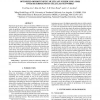Free Online Productivity Tools
i2Speak
i2Symbol
i2OCR
iTex2Img
iWeb2Print
iWeb2Shot
i2Type
iPdf2Split
iPdf2Merge
i2Bopomofo
i2Arabic
i2Style
i2Image
i2PDF
iLatex2Rtf
Sci2ools
ICASSP
2009
IEEE
2009
IEEE
Optimized opportunistic multicast scheduling (OMS) over heterogeneous cellular networks
Optimized opportunistic multicast scheduling (OMS) has been studied previously by the authors for homogeneous cellular networks, where the problem of efficiently transmitting a common set of data from a single base station to multiple users that have identical channel statistics was examined. It has been demonstrated that OMS can achieve significant performance improvement by exploiting the optimal tradeoff between multiuser diversity and multicast gain. In this work, we extend our studies to heterogeneous networks with users subject to different channel statistics. Specifically, we consider a single cell wireless network with users uniformly distributed in a circular region around the base station. Since users with low SNR are the ones that hinder system throughput, we argue that system performance may be predicted by the behavior of users in the outmost ring of the cell, which are approximately homogeneous. Using extreme value theory and results obtained from the homogeneous case, w...
Base Station | Heterogeneous Network | Homogeneous Cellular Networks | ICASSP 2009 | Signal Processing |
| Added | 17 Aug 2010 |
| Updated | 17 Aug 2010 |
| Type | Conference |
| Year | 2009 |
| Where | ICASSP |
| Authors | Tze-Ping Low, Man-On Pun, Yao-Win Peter Hong, C.-C. Jay Kuo |
Comments (0)

